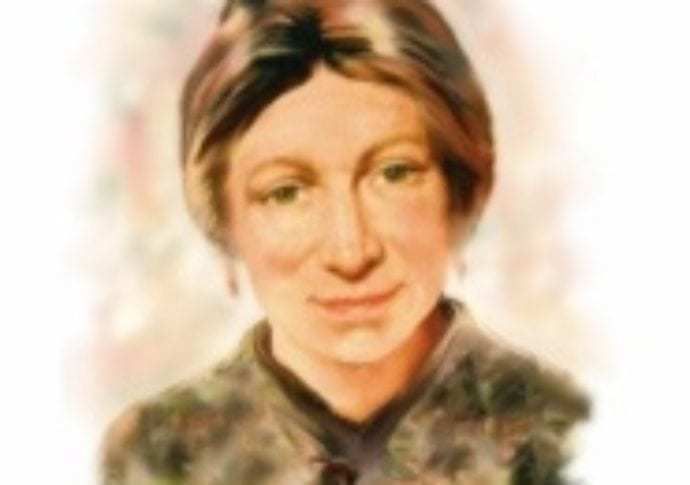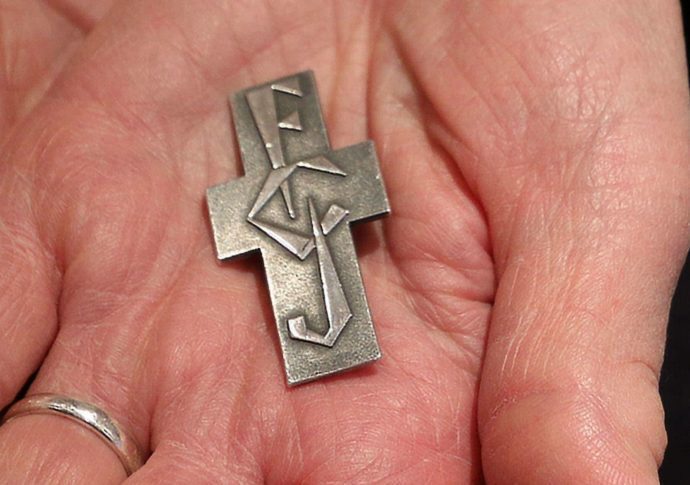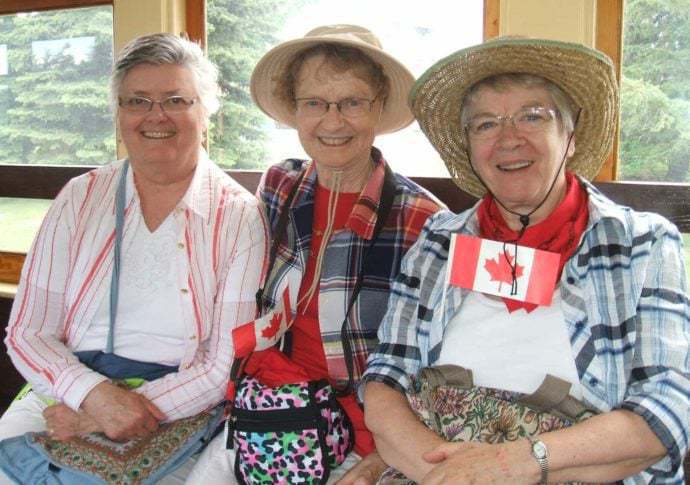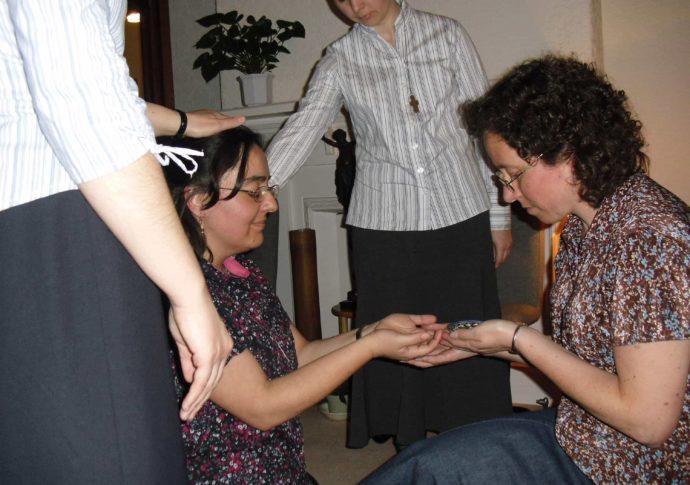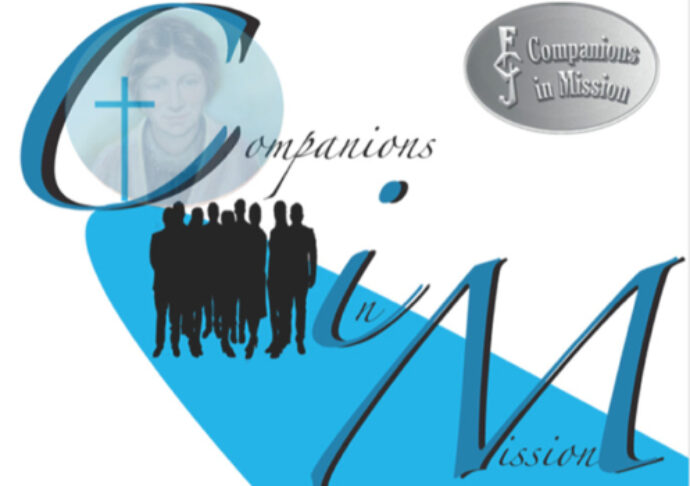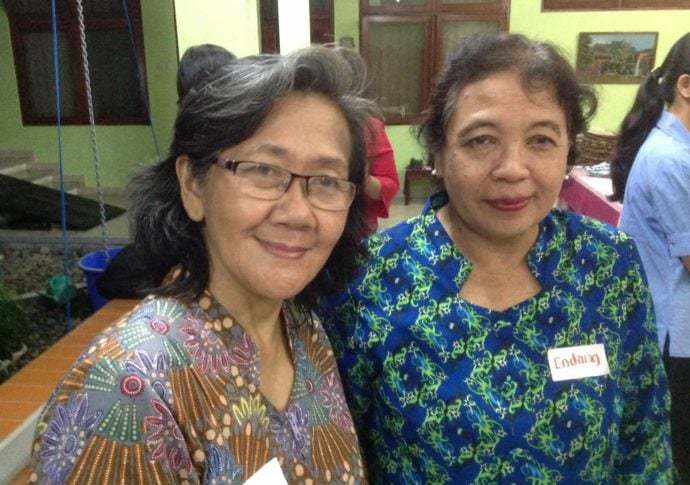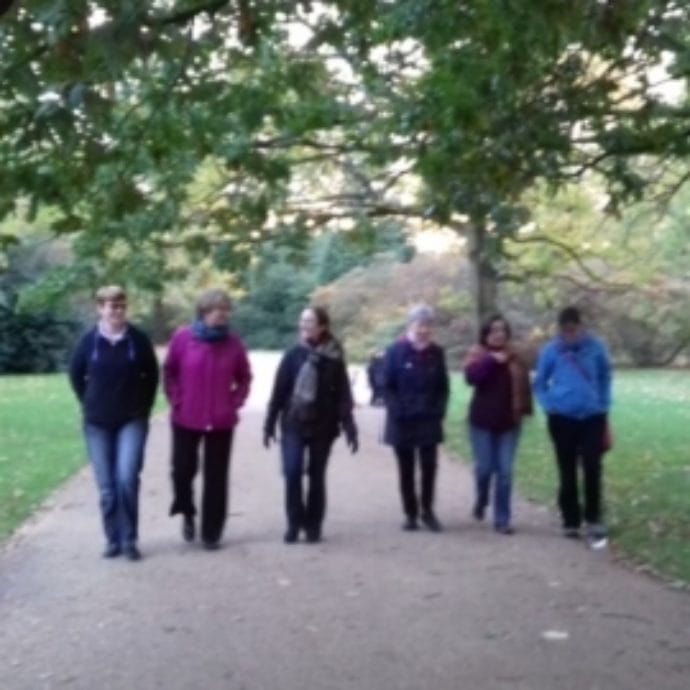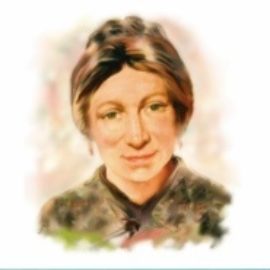Her Life

Her Life
Venerable Marie Madeleine d’Houët: Her Life
Foundress of the Faithful Companions of Jesus, Marie Madeleine is a woman for our time; a French woman of inspiration and courage. She was a daughter, sister, friend, wife, widow, mother.
As a widow, while waiting, searching and constantly doing good to others, Marie Madeleine d’Houët was inspired by the spirit of Ignatius of Loyola as she saw it lived in the lives of the Jesuits at St. Acheul, Amiens and as she imbibed it in her conversations with Fr. Varin SJ. Eventually, after profound spiritual experiences, accompanied by many trials and difficulties, and in the wider context of post-revolutionary France, she became a religious sister and foundress of a group of Catholic sisters known as the Faithful Companions of Jesus.
The first companions worked with women and children in Amiens. As the Society developed, Marie Madeleine traveled extensively founding communities in France, England, Ireland, Italy (Savoy) and Switzerland. Despite her commitment to the Society, she continued to remain an affectionate mother to Eugène and grandmother to his children. After her death in 1858, FCJ communities were founded in Australia, Canada, Scotland, Belgium, the USA and Jersey. In more recent years communities were founded in Sierra Leone, Indonesia, the Philippines, Argentina, Bolivia, Romania, Mexico and Myanmar. The FCJ Sisters work in different ministries and share life in community. But above all their mission is to be Companions of Jesus whose lives long to reveal Jesus to the world.
Marie Madeleine lived her own life with courage and confidence, and courage and confidence became a prayerful wish she often offered to others and offers now to us.
Let us look more closely at her story—
Her Names
Baptised Marie Madeleine Victoire, the foundress was called Gigi as a child, Victoire as a young woman and Madame Joseph as a young wife and widow. To others, she was Madame d’Houët, or Marie Madeleine Victoire de Bengy de Bonnault d’Houët. However she herself wrote:
My name is Magdalen. I will follow my patron saint who so loved Jesus, ...as to accompany him in his journeys and labours, ministering to him even to the foot of the Cross with the other holy women who did not like the apostles, abandon him, but proved to be his faithful companions.
Madeleine is French for Magdalen and this is the reason we call her Marie Madeleine.
Early Years
Marie Madeleine was born September 21, 1781, in Châteauroux, France, into a large extended family. In addition to her immediate family, she was surrounded by aunts, uncles and cousins. It was a happy, secure family, long established in Berry, France, where various members held distinguished positions in both church and kingdom. With the onset of the Revolution in 1789, they knew hardship, prison and exile.
Gigi, as she was known as a child, was close to her parents. When she was one year old, her two-year old brother, Etienne, died and we can only imagine how doubly precious she became to them. She was nearly three when Claude was born, six when Angèle arrived and fourteen at the time of Philippe’s birth. Philippe always regarded her as a second mother.
Madame de Bengy was a wise and loving mother who showed herself courageous and persevering when her husband was imprisoned by the Revolutionaries. She did not buckle under adversity or allow herself to give way to despair.



Marie Madeleine's birthplace and the church of St Martial, where she was baptised, Châteauroux, France. Her farmhouse at Pouplain.
As they faced their changed circumstances, she divided her energies between working for her husband’s release and bringing up their children in a secluded farmhouse at Pouplain. She trained Victoire in the arts of housekeeping and homemaking, but it was her mother’s example of fidelity to prayer and trust in God which remained with Victoire to the end of her life.
Victoire loved her mother, but it would seem that her father was the centre of her young life. When Madame de Bengy gathered her children to pray for their father’s release, Victoire tells us that her secret prayer was that she might be imprisoned and die with him!
Her wish was not granted! Once her father was released the family moved from Châteauroux to Issoudun and the eighteen-year old, no longer Gigi, but Mademoiselle Victoire embarked on the next stage of her life’s journey.
Joy and Sorrow
Friendship
Victoire became friends with a girl about her own age, Constance de Rochfort. The two were inseparable, enjoying long conversations, pouring out their troubles and pleasures to each other. Together they went round the town, visiting people who were sick, helping people in need and volunteering their services at the local Hospice of St. Roch.

Hospice St Roch, Issoudun.
Like any teenager fired with a sense of justice, Victoire was indignant to learn that those allegedly serving the sick at the Hospice were taking for themselves the food and wine meant for the patients. Even when she was a child, her family had been well aware of her determination, even stubbornness, and so no-one was surprised when she reported the abuses to the authorities and persevered with her case until things were put right.
A Loving Marriage
According to the custom of the time, Victoire’s father chose her bridegroom, Joseph de Bonnault d’Houët. Although it was decided upon by their parents, it was a marriage into which both Victoire and Joseph entered freely and gladly. Constance was well aware her friendship with Victoire would necessarily change and she knew too that Victoire did not see the matter as she did! I do not want to give up the joy of intimate talks with you simply because you have a husband. I have had a grudge against him for a long time, because he is the cause of our separation. What grieves me is that I am very much afraid that you do not share my feelings!
Victoire and her mother planned eagerly for the wedding. They made lists and embarked on shopping expeditions, choosing materials and patterns for the trousseau. Silk, wool and worsted all figure in their letters, Mademoiselle Janette was entrusted with the making of underclothes and six morning jackets of the finest cotton.
There was general rejoicing over the marriage which took place in the vast Cathedral at Bourges, 21 August 1804.

Bourges Cathedral - the chandeliers were a gift from Marie Madeleine's family on the occasion of her wedding.
Joseph and Victoire made an attractive couple as they took their place in the social life of Bourges where both their families were well known. They were happy too in their own home where they read and prayed together. As Victoire and Constance had done, they visited the sick; Joseph also visited Spanish prisoners of war held in the city, providing food and comforts for them. He believed, as did his father-in-law, that the greatest riches one can have are the esteem and regard of one’s fellow citizens; to merit it one must make oneself useful.
A young widow
On one of these expeditions Joseph caught typhoid fever. For six months he was desperately ill and, despite Victoire’s tender care, died less than a year after their marriage. His funeral with solemn Requiem took place in the Cathedral where they had married. Victoire, who was pregnant, was stunned by grief and the town was shocked by the untimely death of this generous and loving young man. Among the letters of sympathy was a letter from Constance de Rochfort: Dear friend, you have such living faith, you are so wise, that it is within your own self that you will find the greatest source of comfort. In the two states in which up to now God has placed you, you have been an example to daughters and wives. Very soon, you will be the same for mothers.

Le Vieux Pressoir, Parassy
Victoire’s dowry from her parents was the manor house at Parassy. It was an idyllic spot, surrounded by meadows, farmland and vineyards. She and Joseph had gone there the day after their marriage and within two weeks of his death she went back, seeking to come to terms with her loss. Grief was not a luxury she could allow herself for already she was almost eight months pregnant.
A single mother
It was seen as imperative that she return to the de Bonnault family home for the baby’s birth. Her child, Eugène, Joseph’s heir, was born 23 September 1805.
Despite the loving care of her double family, it seems that Victoire suffered postnatal depression. She suffered from anxieties which made her fear her child was dead and arranged, that on her return home, someone would stand at the window and wave to assure her that all was well. She had nightmares in which she saw her own funeral. But gradually she recovered equilibrium and again enjoyed parties, balls and theatres. She returned to the works she had undertaken with her husband and made such good use of her wealth that a murderer on trial in Châteauroux was quoted as having said there were three rich people in the town and two were to be killed – but not Madame de Bonnault. She, he insisted, with a note of approval, puts her money to good use!
Joseph had told her: If God gives us a daughter, train her as your mother trained you, and now she guarded jealously the formation of her son. Always aware of Eugène’s loss, she was unwilling to discipline him too firmly with the result that her mother-in-law threatened to intervene. Such a threat galvanized Victoire into action!
As she looked at Eugène, who according to his grandfather grew very like his father, she would have been aware of what Joseph had missed. The interest with which she watched over her son and grandsons as they advanced in their chosen professions, must have always reminded her that it was a joy Joseph had not shared.
Victoire’s cousin Claude and his wife lived nearby. Anne-Augustine was about the same age as the young widow and formed a close relationship with her. Their first child, Armande, often played with Eugène, the two young mothers delighting in their antics.
Waiting and Searching
With the passing of time, absorption in Eugène’s upbringing, administration of property and duties in family, Victoire grew into her role of single parent. The dramatic effects of Joseph’s untimely death and her early widowhood faded into semi-oblivion and Victoire gradually took her place in Society once more. Victoire thought seriously of remarrying and shared this with her sister, Angèle, her great confidante.
She took her problem to Abbé Gaudin, a holy priest and wise counsellor. She told him she had an excellent offer of marriage which, besides holding the promise of love and personal happiness, seemed to offer the remedy for the inevitable suffering arising from difficult family relationships. She told him of the misgivings of her husband’s family concerning the administration of the family fortune and the education of their grandson and heir.
The advice given to Victoire by the Abbé was to pray.

In prayer, Victoire, now twenty-eight, thirsting for peace, love and quiet domestic happiness was to be deeply surprised by her encounter with her Lord. Years later she told Abbé Georgelin, chaplain in Paris, of her struggle. She told him that one day after communion she had a deep sense of being called to live more trustingly and that God would find her the husband best suited to her.
She told the Abbé that after resisting for a long time, I gave in.
A social conscience
Pleasures became less important to Victoire. The theatre was the first to be sacrificed. Prayer gained ground and the sacraments were received more frequently. But, averse to any outward show of piety, she was careful on her way to morning Mass to approach the church from different directions in order to attract no attention.
Victoire went to Parassy more often and enjoyed being with her people, the tenants and families on the estate. They were for the most part farmers and vine-dressers for whose welfare and happiness she had assumed responsibility. Sure of a welcome, she was for them la bonne dame who was always ready to help in an emergency, whether caring for a sick child, settling a difficult debt, repairing a barn, replacing a piece of machinery. ‘Madame is a good mistress’, they would say. And in the almost complete absence of a priest she taught them how to pray and live their faith.
Just like her husband Joseph, Victoire was conscious of the needs and sufferings of prisoners. Many Spanish prisoners of war were held at Bourges. She regularly paid for bread to be sent to them and in 1809 went incognito, with the Daughters of Charity, to nurse some of them. Like Joseph, she too caught the pestilential disease but, unlike Joseph and the Daughter of Charity with whom she had worked, she recovered. But these experiences of illness made her over-cautious for the rest of her life in what concerned the health of others.
When six Fathers of the Faith were invited to preach a mission in Bourges, Victoire asked that they might be allowed to stay at her home in Rue Paradis. She persevered energetically with her request until all obstacles and difficulties gave way before her and she won her point. When the mission was over she invited them to spend some time at Parassy.
Hospitality for refugees
In 1813, thirty of the Italian churchmen who had been forced into exile by Napoleon arrived in Bourges. No doubt remembering how her uncles and cousins had been forced to flee during the Revolution, Madame d’Houët received seven of them into her home at rue Paradis in Bourges. They never forgot the acts of kindness and welcome which they received from her. She not only housed and fed them, but saw to their clothing and other needs.


Entrance to the parish church in Parassy. Residence at Rue Paradis, Bourges.
A heart hungry for happiness
At this stage of her life, Victoire would happily have defined herself by relationships. Mother of Eugène, Madame Joseph, Mistress of Parassy, daughter, sister, daughter-in-law. But from this circle which gave her identity and security, she was to be led by what she called a long chain of events to something new.
The struggle to establish what God wanted was a hard one. The thought of remarriage still persisted, but although she had a sense that God wanted something different from her, she had no clear sense of what it might be. Her growing prayer was that she might do what God would have her do, and to do it faithfully and joyfully.
Child, aging parents, refugees: to these responsibilities were added those of administrator. Landowner in her own right, Victoire also held Eugène’s fortune in trust. Year after year she continued to go to Parassy for the grape harvest—Parassy where she had gone with Joseph immediately after their marriage and where she had gone with her sister and sister-in-law after his death. Its peace and beauty were always a blessing for her and in time its memory became even more precious.
Finding a good school
Strange as is may seem, the implications of Victoire’s choice of school for Eugène had life-changing consequences for herself. In 1814, the Bishop of Amiens invited the Jesuit priests to open a school in the old Abbey of St. Acheul in the city of Amiens. Victoire rejoiced at the news and decided to send Eugène to the new school even though it was a long way from home. The doting mother arranged to stay in Amiens to help her child settle in and soon found herself doing voluntary work in the school.

In 1814, the Bishop of Amiens invited the Jesuit priests to open a school in the old Abbey of St. Acheul in the city of Amiens. Victoire rejoiced at the news and decided to send Eugène to the new school. She came to appreciate deeply the mission and work of the Jesuit fathers.
Victoire saw Eugène in every child; that string vibrates always with the deepest tones in my heart. She acknowledged that he was never far from her mind. Like many mothers she kept all the letters he wrote from school with news of his health, the food, his friends, his lessons and tests; with his questions about home, herself, his grandparents, and even the state of the grapes at Parassy!
Devoted to Eugène, her mind and heart went out to young people who did not have his opportunities. She treated Ferdinand Jeantier, a pupil at St Acheul who was always delicate and far away from his parents, as a second son. She took him treats when she visited Eugène and brought him to Parassy each summer for the long holidays.
Through her contacts with the college of St Acheul, Victoire came to appreciate deeply the mission and work of the Jesuit fathers.
Imbibing the Spirit of the Society of Jesus
A momentous event in 1815 had unexpected consequences for Victoire. When Napoleon escaped from Elba, Joseph Varin, former Royalist soldier and now Jesuit priest, was again a hunted man. Victoire offered him safe refuge at Parassy, even though, in her own words a dreadful thought came to mind. It seemed to me that if Father Varin came to my house, I would have to enter religion. Despite her fears she did not withdraw her offer of hospitality. The Jesuit remained with her for five months. In his company she came to know more of the Society of Jesus, to imbibe the spirit of the Society of Jesus from his conversation and to practice its spirituality.
As she began to follow a more ordered life of prayer and discernment, the quality in her character which her family knew so well (What Victoire wants, Victoire gets, her mother used to say,) was transmuted into a determination that what God wants, God should get.
One link in the chain taught her to trust. She was daily aware of what she calls terrifying details of the army’s advance; in due course the troops entered the village and the officers arrived at her home. They did not even bother to reply to what I said but continued to speak and act as if they owned the house. I was terrified and prayed silently to the Lord with all my heart. But her situation changed when the Colonel realized that she was the sister of Claude de Bengy with whom he had studied. I have to admit, Madame, that your position was more unpleasant and dangerous than you could have imagined.
She was to need great courage and trust in the years ahead.


The well at Parassy. Fr Joseph Varin (1769-1850) (From Galerie illustré de la Compagnie de Jésus, Vol.VIII, Paris, 1893)
A significant decision
Step by step, though never in a straight line, she followed what she believed was the path laid out for her. One missionary priest whose advice she sought in Bourges, having listened to her account of herself gave as his opinion that God wants your whole heart. You must give it to him without reserve. This opinion was confirmed the following year, 1816, in Amiens when Father Sellier urged me to lead a more perfect life and to make the vow of chastity. I positively refused to do either. In her honesty Madame d’Houët came to acknowledge that on her return to Bourges she experienced such utter weariness and distaste for amusement that I found it impossible to resume social life.
Then on Trinity Sunday, 1817, as she was praying before Mass:
Quite suddenly and unexpectedly it was made known to me that God wished me to make the vow of chastity there and then, in his presence. What was asked of me appeared so clear and positive, that in spite of the strong natural aversion I had felt up till then, I no longer had the slightest objection... I readily and joyfully made the vow.
She made it immediately but conditionally, the condition being that she would renew it on a day to be approved by Father Varin if he agreed with what she had done.
It was six months later that he agreed but by that time people and events had so confused her that all her old fears came rushing back. I positively refused. I said that if God called me to be a religious I would do so willingly but if I remained in the world, I did not wish to bind myself…But she had long prayed to know what God wanted and to be strengthened to do it, faithfully and joyfully, as soon as it was made known to her. I went to the church of St Geneviève and remained there a long time. Only God could change my heart and conquer my resistance. In his infinite goodness this is exactly what he did once more and accepted from me what a mortal man in a similar situation would undoubtedly have refused. Returning to her rooms she confided to her journal: I have spent the evening sitting on the floor, weeping… I continue to have a terrible repugnance.
With utter trust, on December 9th 1817
Before Communion I pronounced my vow ... at the same moment all my fears and misgivings vanished for ever. This day, the most beautiful of my life, has ever since been for me a great source of consolation and a motive for eternal gratitude.
But consolation did not mean pain and suffering were excluded from her life.
She describes Father Varin SJ as this holy man who wanted at all costs to unravel what came from God and what might have merely sprung from my imagination.
I Thirst
As early as 1816, Victoire tells us, she had received a clear and consoling light that God wanted me in the religious state but not as a Carmelite as I had occasionally imagined, but working actively for the salvation of souls. The attraction to Carmel, however, remained. The following year, within a week of the conditional vow of chastity, whilst reflecting on the happiness of those who belong entirely to God and whose only occupation is loving and communing with him I regretted that I was not called to Carmel.
I Thirst
On June 13th Feast of the Sacred Heart, that holy envy was further stifled when she heard from the crucifix over the altar the words: I thirst.
I was deeply moved by these words. I knelt in adoration and offered myself to God with my whole heart for all that he asked of me.

A few days later she realised that she was called to found a Congregation whose members would be companions of Jesus in the contemporary world.
Problems on all sides
Father Varin took seriously the responsibility of testing her vocation and on more than one occasion reduced her to painful tears. But she had learnt that in God alone she was to find strength. When the priest said things which I no longer remember but which were so harsh that I felt I could not bear it, all I could do was to cry out interiorly `Have mercy on me’. An interior voice, distinct and gentle comforted me: Courage my daughter; the time of trial does not last forever. Father Varin continued, but say what he would I was filled with unspeakable peace and confidence. During a pre-Christmas retreat in 1817 she experienced great spiritual aridity and darkness. When Father Varin began his midnight Mass sermon with the words Rejoice all you who hear me, for I bring you tidings of great joy… I said to myself Let everyone else rejoice; I cannot. Then suddenly I felt myself completely transformed… I was inundated with unsurpassed and indescribable peace. My will was entirely changed and changed for ever… I ceased to bargain with God… I was calm and resigned to everything that God asked.
Another quite different source of suffering was her family. Even after Father Varin had agreed that God was asking the foundation of her, she was obliged to return to Berry lest my family should hear what I was doing and become anxious on my account. My mother and father-in-law would have strongly opposed me, especially the latter, who would have gone to Rome if necessary to prevent my taking such a step. Both died in ignorance of my project, a fact in itself actually astonishing for when the work had really begun everyone in Amiens knew of it and a number of people from Berry, all known to me, continually visited the town.
Her mother’s death
In 1820 she was summoned from Parassy to her mother whose death was a double sacrifice because my father who was now alone and knew nothing of what I had begun, insisted on my staying with him. Could I have had one wish in all my life, it would have been, above all else, to care for him and give him every possible proof of love. My heart was truly torn… My father could not understand. This sacrifice was for me, I believe, the greatest of all. On leaving him I was desolate and inconsolable.
A significant name …
Father Varin had tried to convince her that she was called to join the Society of the Religious of the Sacred Heart. He brought pressure to bear on her by introducing her to the Foundress, Sophie Barat, but in the midst of her struggle and sufferings, in the midst of doubts and uncertainties, as she wept one day in another garden, light dawned.
My name is Magdalen; I wish to be like my patron saint who loved Jesus her Master so truly that she ministered to his wants, and followed him in his travels and his undertakings to the very foot of the Cross. She and the holy women did not, like the Apostles, leave him in his hour of need, and throughout his public life they proved themselves his faithful companions. I want a group of women religious who, with me, will bear the name:Faithful Companions of Jesus
Victoire had reached her new identity.
Marie Madeleine she would be now in deed and in truth, companioning with Jesus living in those he delights to call his sisters and brothers.
The Society is established
In Paris on Holy Thursday, 30 March 1820, Father Varin told her, Well then, I may as well confess the entire truth. I believe that God wants this work. I am sure of it and in spite of all the trials I have made you endure and the incertitude I have so often shown, I have never doubted it for one moment.

That night, as Marie Madeleine knelt before the Altar of Repose reflecting on the mysteries being commemorated, the mystery of the Eucharist, the Passion and Death of Jesus, she offered herself anew, with all her heart, to be his faithful companion from the crib to the cross.
In the years ahead, she never tired of reminding her sisters that it was on Holy Thursday night, between the Upper Room and Calvary, that their Society had its beginning.
From that point on her struggle was not with herself, but with those who had once been her support. Once she realised that her call was to found a Society of women religious, many clerics abandoned her even when they did not actively oppose her and in Rome itself she found enemies at work.
The early days of the Society
Marie Madeleine loved children and from their earliest days in Amiens in 1820, the Faithful Companions looked after poor children.
In addition, a small group of the so called cotton pickers found their way into the sisters’ care. These children worked in the textile factories gathering up the tiniest bits of cotton from the floors, the looms, the cards, as raw cotton was so expensive. When sorted and cleaned their cotton pickings were sold to the spinners and the bit of money received supplemented the family income.
Obviously, the youngsters were given time to unravel and clean their cotton pickings, but they learnt their catechism, did lessons in reading and arithmetic, had the chance to play games together and to enjoy some childhood. Marie Madeleine and her sisters gave these children love and care when the norm was child exploitation.
As more companions joined Marie Madeleine she was able to expand the work with the poor children. But more space was needed and, impressed by the work of this new religious group, the town authorities obtained from the Minister for War a disused building for their use.
Working with Women
The early Companions did not confine their work to the poor children of their neighbourhood. Marie Madeleine recognised the need to help the families, particularly the mothers. Pragmatic and compassionate, she recognised the suffering of these poor women and did something to alleviate it.


In the midst of these new beginnings, what happened to Eugène?
Eugène completed his studies at St Acheul in 1826. His final college report was glowing. That September Marie Madeleine visited St Acheul to thank the staff for their care of her son. Like many in the family, Eugène chose the legal profession as his career and studied at the University of Paris. (Ever solicitous, his mother found him both an apartment and a housekeeper.) In 1830 she was as proud as any mother when she was able to write to a friend that he had done brilliantly in his law exams.
Eugène wanted to marry and his mother and friends helped him look for the ideal wife! Eventually, with a lot of prayer and after a lot of introductions, Eugène himself met Louise Bosquillon d’Aubercourt, his future wife. Marie Madeleine liked Louise very much and was convinced the marriage would be blessed in heaven. Eugène and Louise had three children and the FCJ sisters continue to be in touch with their descendants.
Despite their love for each other, it seems that Eugène found it difficult to understand his mother. Marie Madeleine established thirty houses in her lifetime and he thought some of his inheritance was being used for this, a hurtful accusation that was totally disproved. At times, their relationship was strained. As is often the case, Marie Madeleine had a very loving relationship with her grandchildren.
The wider context
In the wake of the French Revolution, women all over France worked for the restoration of the primacy of religion in French life and for social stability. Many of these women formed groups for mutual support and in numerous cases these developed into religious communities. It is an amazing fact that between 1800 and 1820 thirty-five new communities of women were founded in France; and each year between 1820 and 1880 six new communities were founded.
The women who founded these communities came from all sections of French society. Moved by the suffering and social unrest around them, and by the dearth of spiritual comfort, they dedicated themselves to a range of activities that helped alleviate poverty, brought comfort to the sick and dying and helped the wholesome education of children.
There were huge needs in French Society for many years after the Revolution and this gave impetus to the new religious groups who shared the desire to re-build and renew the world of their day. The founders of these groups were kindompeople, fired with a passion to spread the Good News. They were innovative in the way they did this.
They lived frugally and suffered hardship in trying to bring comfort to others. But not only did they attend to immediate needs, they looked to long term needs. Whilst we can be fairly sure that terms such as succession planning and long term strategy were not in their language, we can see that they put into practice these tenets of modern management theory. These founding women showed great ingenuity in both maintaining and extending their communities. They spread from the towns and villages of their beginnings, beyond France, throughout Europe and into the wider world.

Marie Madeleine was part of this vital, energetic movement and the Faithful Companions of Jesus were one of these new groups. From its beginnings in 1820 in Amiens, France, they now live and minister in fifteen countries and have worked on every continent.
When the Society began in 1820, Marie Madeleine was thirty-eight years of age and there were another thirty-eight years of life before her. The first half of her life had been spent as daughter, wife and widowed mother; the second half was spent as an apostolic religious, the joyful messenger of Jesus Christ, striving by every means in her power to make him known and loved.
A Beautiful Name is claimed
Between the beginning of the Society in 1820 and her death in 1858, Marie Madeleine travelled extensively, establishing communities in several French dioceses, in Savoy, in England, Switzerland and Ireland. She twice visited Rome, in 1826 and 1837, seeking approval of the fledgling Society. Amidst much opposition, especially from the Jesuits, she received Papal approbation and approval of the name, Faithful Companions of Jesus from Pope Leo XII in 1826. On her return to Rome in 1837, Gregory XVI said to her in conversation:
You have a beautiful name but you must accept the consequences and as Companions of Jesus suffer with him.
Pope Gregory XVI
Later in life
In later life the words Courage and Confidence were always on Marie Madeleine’s lips, a motto she had learned through experience; not only in the face of death and widowhood and the challenge of bringing up her son alone, but also in the face of opposition and persecution in the development of the Society.
Say to each one courage, courage and confidence. That is all that is necessary, she wrote to Mother Maria Lebesque in 1830. Courage and confidence, but above all great confidence was a variation on the theme which appears in almost every personal letter she wrote. Clearly it was a prayerful wish she offered others.
To each and everyone Marie Madeleine still says: Courage and confidence, knowing that we in our turn are called to make a difference in the world.
In her Memoirs, Marie Madeleine writes that she gives the details of the experiences leading to the foundation of the Society in order
to show you that I have counted for nothing in its foundation and to let you see how God in his goodness did everything himself.
Her death, Paris, Easter Monday April 5th 1858
On Easter Sunday, the day before her death, Marie Madeleine was visited by Léon de Bonnault, one of her grandsons. On Easter Monday, lovingly surrounded by her sisters– the members of her still young Society — Marie Madeleine died. Marie Madeleine was buried in the little cemetery attached to the orphanage she had founded at Gentilly in the southwest of Paris.
Her body remained at Gentilly until 1904. Then, because of anti-clericalism in France and the subsequent suppression of religious houses, it was taken, with full permission of the civil and ecclesiastical authorities, to Upton Hall Convent FCJ, near Birkenhead in England.
There it remained until June 1980 when it was moved once more, this time at the request of the postulator of the Cause of her Beatification and Canonization. Marie Madeleine’s body was interred in the chapel at Stella Maris Convent FCJ, Broadstairs, England.
One last journey awaited her. In September 2012 her remains were moved a final time to the Church of St. Dominic in Paris, in the very neighbourhood in which she had lived and died. More…

Marie Madeleine had declared that she counted for nothing in the foundation of the Society, but at the time of her death, amidst the sorrow of her sisters, there was rejoicing and gratitude for the way she had so deeply collaborated with the desire of God for her life’s mission.
The gratitude and the joy remain ours today!
For more information explore our Resources page.





